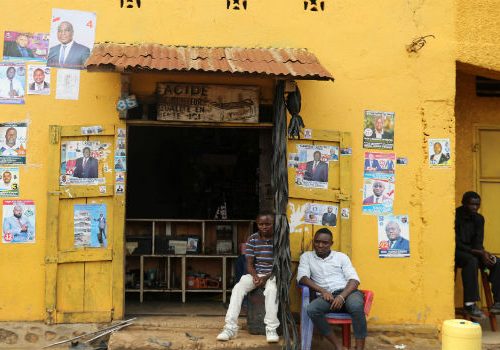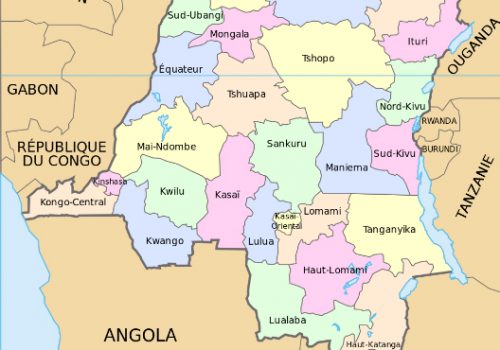Congo, one year later
On January 25, 2019, Félix Tshisekedi was implausibly named president of the Democratic Republic of Congo, having in all likelihood finished a distant second to opposition leader Martin Fayulu in elections held in late 2018. The election results were rigged by the outgoing president, Joseph Kabila, who is believed to have offered Tshisekedi a devil’s bargain: the presidency in exchange for allowing Kabila to retain control, behind the scenes, of the legislative branch, the security sector, and much of the country’s economic rents.
Many Congolese as well as Western chanceries chose to overlook this electoral fraud, arguing that the miscarriage of democratic justice was a worthwhile price to pay in exchange for finally ridding the Congo of the Kabila dynasty (Joseph’s father, Laurent, was president before him). But, one year later, how much of a transition has there actually been?
Not much. By and large, Kabila appears to have remained in charge. His political coalition, the Front Commun pour le Congo (FCC), controls about 340 of 500 seats in the National Assembly, and about ninety of 109 seats in the Senate (though given the fraudulent results of the presidential election, there is no way of knowing whether these numbers represent the will of the voters). The FCC coalition also controls much of the government architecture under Prime Minister Sylvestre Ilunga, and has the loyalty of twenty-two of Congo’s twenty-six provincial executives. Moreover, the nearly ten thousand-strong Republican Guard remains firmly under Kabila’s thumb. The deposed leader continues to travel through Kinshasa with a security entourage that easily rivals that of the actual president. Adding insult to injury, Kabila is still living in the presidential compound on the banks of the Congo river (when he is not on his private Kingakati farm south of Kinshasa).
Yet, uncertainty is a dominant feature of Congolese politics, and while Kabila retains the upper hand for now, this is uncharted territory, and there are some early signs of engine trouble in the Kabila machine:
First, Tshisekedi has, to his very great credit, been successful in liberalizing Congo’s political climate. Opposition parties are back and organizing freely, political prisoners have been freed, and the dreaded Agence Nationale de Renseignements (ANR) has curtailed its repressive activities.
Second, the FCC coalition is less monolithic than it appears and some of its members have begun showing signs of indiscipline and independence. In particular, the corruption and rapaciousness of the leading coalition member, the Parti du Peuple pour la Reconstruction et la Démocratie (PPRD), which has served as Kabila’s inner sanctum, has irked other coalition members.
If these intra-party tensions are allowed to fester, Kabila may find it challenging to keep his coalition in order for another four years. For example, in July 2019, Modeste Bahati Lukwebo, the leader of the second largest party of the coalition (the Alliance des Forces Démocratiques du Congo, AFDC) openly rebelled against Kabila when he was not given the Senate’s presidency. For standing against Kabila’s chosen candidate, he was expelled from the FCC. Most of Bahati’s colleagues sided with Kabila, and remained inside the FCC coalition. But with twenty-four different political groups representing 166 parties in the FCC, other fissures are inevitable. For now, Kabila will use his loyal enforcers—like John Numbi, Inspector General of the police—to intimidate would-be defectors. But with so many members, the spoils of party membership are spread thin, and many on the fringes of the FCC might be tempted to look for other alliances.
It would take time to build a new majority. Tshisekedi’s coalition (called Cap pour le Changement, or CACH) has a mere forty-eight seats in the National Assembly, and Martin Fayulu’s coalition (called Lamuka), has only 103. More than a hundred people would need to fall out of the FCC to claim a majority of the Assembly’s five hundred seats – and an alliance between CACH and Lamuka seems unlikely, given lingering bad blood over the stolen election. Lamuka may, however, not survive the creation of a new party (Ensemble pour la République) by its most powerful member, Moïse Katumbi, in December 2019, probably in pursuit of his own presidential ambitions. Still, while a new majority may be unlikely, any erosion of the FCC’s majority in parliament could send a contagious signal.
Third, though Tshisekedi’s appointees in the government are outnumbered by Kabila’s (CACH has twenty-three ministerial posts while FCC has forty-two), a number of them have been able to carve out a degree of autonomy. Gilbert Kankonde, the Minister of Interior, has defied the FCC over provincial appointments, and Marie Tumba Nzeza, the Foreign Affairs Minister, has managed to dismiss diplomats who had been appointed by Kabila.
Fourth, after considerable earlier difficulties, Tshisekedi has begun to bring in some government revenue, which might help him emancipate Congo’s budget from Kabila’s financial stranglehold. The former president still controls the heads of most state enterprises that are Congo’s cash cows, but in December, the International Monetary Fund (IMF) agreed to a $368 million emergency line of credit for Congo, lifting a ban on aid in place since 2011, and agreed to work towards a multi-year program by mid-2020. Tshisekedi will need every penny of this money and more if he is to come through with his ambitious 2020 budget which, with about $10 billion in expenditure, is some $5 billion over expected revenue. But it is a start, and more aid to Congo will roll in if Tshisekedi is able to show some positive results.
Fifth, Tshisekedi has succeeded in warming relations with Brussels, Paris and Washington, giving him some useful international support, as well as aid potential, to boost his legitimacy in Congo. Like Kabila at the beginning of his own rule, Tshisekedi has consciously played the international card to strengthen his hand at home, taking no fewer than thirty-one trips out of the country in 2019. And although Tshisekedi has prudently distanced himself from the expanding raft of Western sanctions against the enablers of Kabila’s regime, he has certainly been helped by them.
Finally, while there has been little to no progress at all on the corruption front—with the presidential cabinet itself rocked by allegations of disappearing funds, and the Observatoire de la Dépense Publique (a watchdog NGO) accusing Tshisekedi’s administration of many corrupt practices that recall the former regime— Tshisekedi has begun to selectively enforce some laws against Kabila’s clan. In December, for example, the head of the mining parastatal and of the Federation of Congolese Enterprises, a Kabila loyalist named Albert Yuma, was accused of diverting $200 million in funds. Though it is unlikely that he will truly be held to account, Yuma was prevented from leaving the country and was forced to appear in person before the Court of Appeals in Kinshasa. If he persists with such prosecutions, Tshisekedi may eventually be able to diminish the spoils available to keep Kabila’s political coalition in line.
Least successful so far have been Tshisekedi’s attempts to curb violence in the east, one of his primary campaign promises. The armed forces are actively engaged in battles with the Allied Democratic Forces (ADF) in Ituri and taking substantial losses, but so far with little visible progress. Across Ituri and North Kivu, and also in Tanganyika, violence remains widespread and the state largely helpless to protect its citizens.
Overall, while there has clearly not been any regime transition in Congo, there are faint stirrings of change. It is long shot, but it seems that the Western strategy of embracing Tshisekedi in exchange for Kabila’s removal from office may yet – possibly, hopefully – bear some fruit. It remains to be seen whether the West’s disregard for electoral outcomes will critically undermine the future role of elections in consolidating change.
Pierre Englebert is Senior Fellow at the Atlantic Council and the H. Russell Smith Professor of International Relations and professor of Politics at Pomona College.
Further reading
Image: Democratic Republic of Congo's outgoing President Joseph Kabila sits next to his successor Felix Tshisekedi during an inauguration ceremony whereby Tshisekedi will be sworn into office as the new president of the Democratic Republic of Congo at the Palais de la Nation in Kinshasa, Democratic Republic of Congo January 24, 2019. REUTERS/ Olivia Acland TPX IMAGES OF THE DAY


